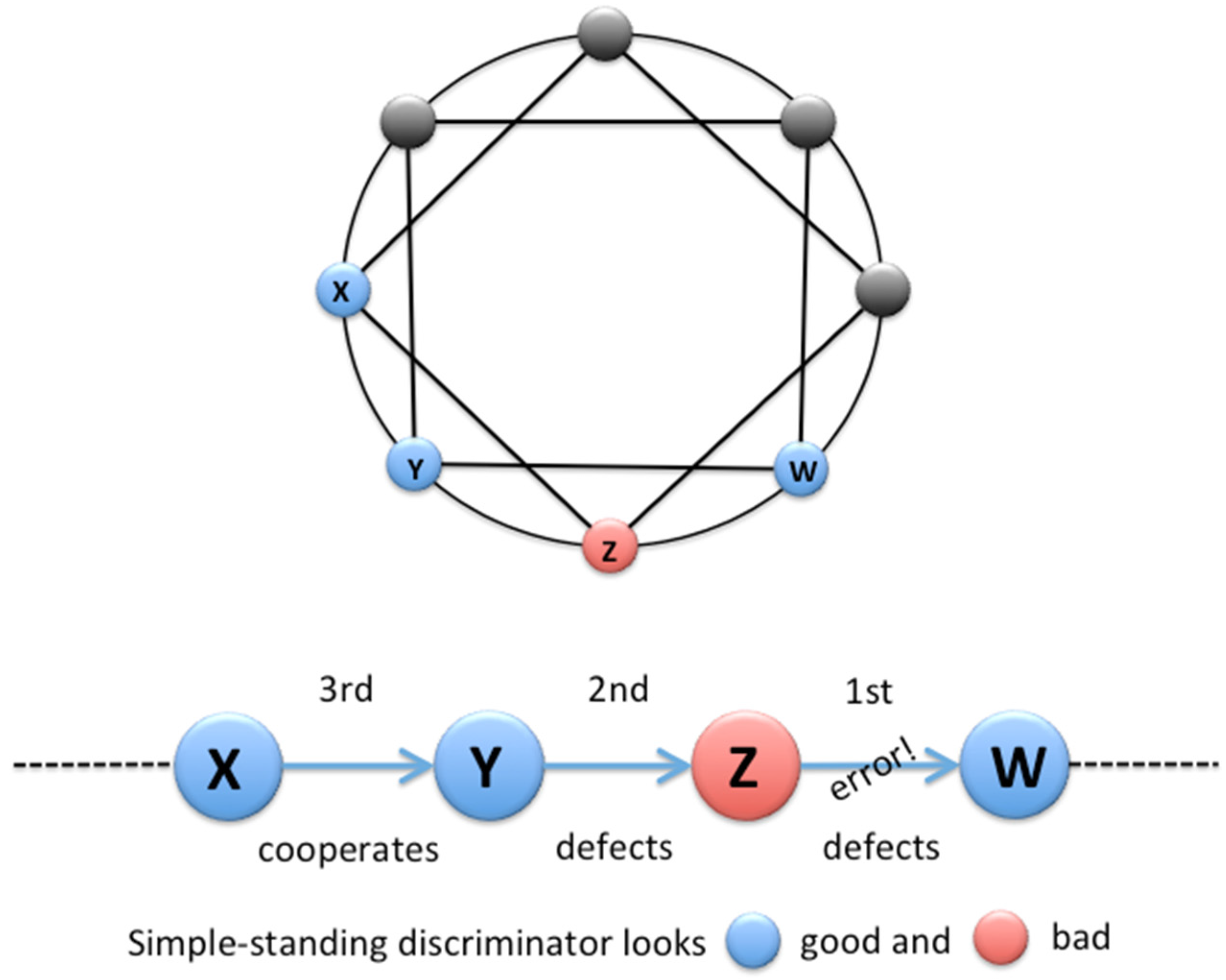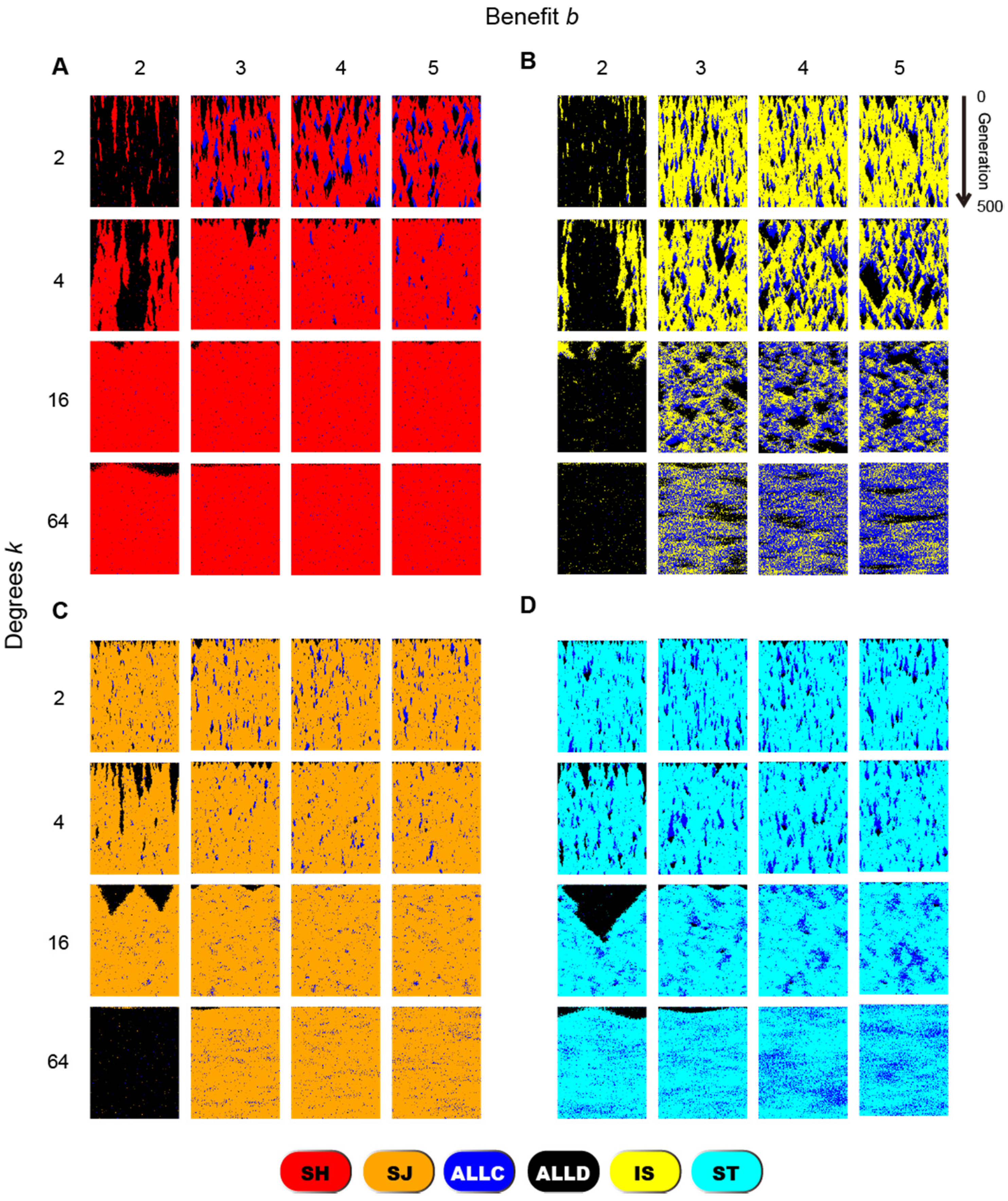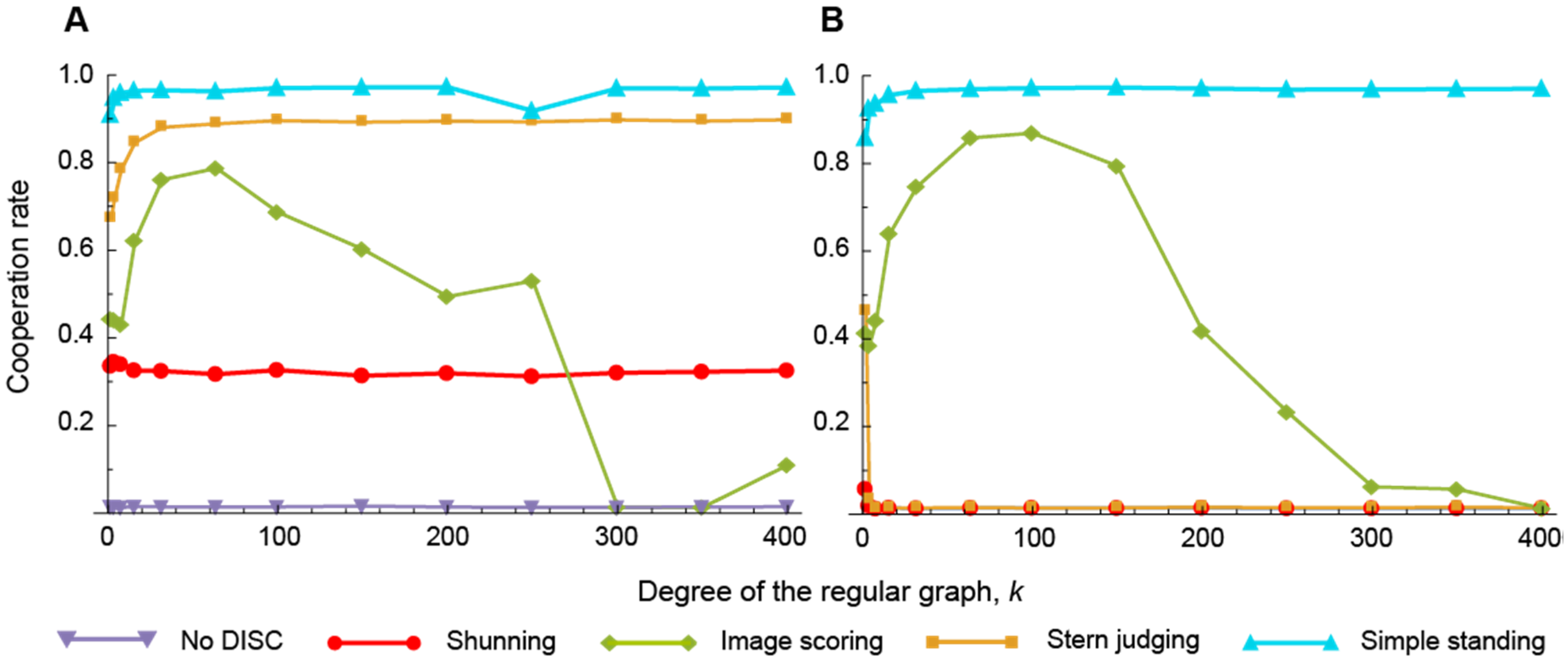The Evolution of Reputation-Based Cooperation in Regular Networks
Abstract
:1. Introduction
2. Materials and Methods
2.1. Individual-Based Model
Population Structure, Individual Structure, and Trial Sequence
- (1)
- Player-selection phase. A focal player is selected, as aforementioned, and is then offered an opportunity to help a recipient player, who is randomly selected from the focal player’s closest neighborhood.
- (2)
- Giving-game phase. This is a one-shot giving game [7]. Depending on his/her strategy (whose details are given later), the focal individual determines whether to give help to the recipient or not. Giving help requires either personal cost c > 0 or nothing. Giving help means to play C, and not-giving help means to play D. Each helping action leads to benefits b for the recipient with b > c. This is a social-dilemma situation: if the interaction is random matching, irrespective of what others do, switching to playing D is more advantageous than playing C by saving costs c; nevertheless, the net payoff is 0 if both play D and b − c > 0 if both play C. We assume implementation errors, in which the focal player who intends to play C will implement D with probability p and, similarly, the focal player who intends to play D will implement C with probability p. That is, the implementation error is bilateral.
- (3)
- Image updating phase. Finally, each player (except for the focal player) synchronously updates his/her own player-image list by assessing the focal player. We examine two extreme monitoring scenarios: every giving game is monitored by (i) a representative observer with a proper assessment rule (indirect observation) or (ii) all players (except for the focal player) (direct observation) [54]. In (i) indirect observation, the representative observer assesses the focal player, relying on the focal player’s last action in the giving game and the recipient’s image. We assume assessment errors: in making assessments, the representative observer makes errors with probability q, in which the representative observer assigns a good image to those who, in the case with no assessment error, should have a bad one or a bad image to those who, in the case with no assessment error, should have a good one. Hence, the assessment error is bilateral. The same assessment information regarding the focal player is then shared by all individuals, whether that information is erroneous or not [8,9]. In (ii) direct observation, all observing individuals independently assess the focal player, and each individual independently commits to assessment errors with probability q [55], as is assumed of the representative individual in (i). In this study, we do not consider any specific consensus formation among individuals.
2.2. Game Strategies and Assessment Rules
- Defector (ALLD): playing D unconditionally
- Cooperator (ALLC): playing C unconditionally
- Discriminator (DISC): playing C (if the recipient has a good image) or playing D (if the recipient has a good image)
- Shunning (SH): either assessing a donor as good if the donor plays C to a recipient who has a good image or assessing the donor as bad. Shunning is the strictest among the four rules [50].
- Image scoring (IS): either assessing a donor as good if the donor plays C or assessing a donor as bad if the donor plays D to a recipient, irrespective of the recipient’s image. Image scoring is the simplest among the four rules because it depends only on the donor’s action [40].
- Stern judging (SJ): assessing a donor as good if the donor either plays C to a recipient who has a good image or plays D to a recipient who has a bad image. Stern judging is the second strictest assessment rule because a player who has a bad image can also cleanse that image by refusing to help another player who has a bad image [48,49]. This assessment of defection is a so-called “justified defection” [3]. Stern judging is one of the eight leading rules [8,9].
3. Results
3.1. In the Absence of Indirect Reciprocity
3.2. Public Assessment
3.3. Private Assessment
3.4. Evolution of Spatial Patterns
3.5. Short Summary of Simulations Conducted for Long Periods
4. Discussion
Acknowledgments
Author Contributions
Conflicts of Interest
References
- Yamagishi, T.; Yoshikai, N. Towards trustable information society. J. Inst. Electron. Inf. Commun. Eng. 2005, 88, 54–56. [Google Scholar]
- Milinski, M. Reputation, a universal currency for human social interactions. Philos. Trans. R. Soc. B Biol. Sci. 2016, 371, 20150100. [Google Scholar] [CrossRef] [PubMed]
- Sugden, R. The Economics of Rights, Cooperation and Welfare; Blackwell: Oxford, UK, 1986. [Google Scholar]
- Wedekind, C.; Milinski, M. Cooperation through image scoring in humans. Science 2000, 288, 850–852. [Google Scholar] [CrossRef] [PubMed]
- Wedekind, C.; Braithwaite, V.A. The long-term benefits of human generosity in indirect reciprocity. Curr. Biol. 2002, 12, 1012–1015. [Google Scholar] [CrossRef]
- Sommerfeld, R.D.; Krambeck, H.-J.; Semmann, D.; Milinski, M. Gossip as an alternative for direct observation in games of indirect reciprocity. Proc. Natl. Acad. Sci. USA 2007, 104, 17435–17440. [Google Scholar] [CrossRef] [PubMed]
- Nowak, M.A.; Sigmund, K. Evolution of indirect reciprocity. Nature 2005, 437, 1291–1298. [Google Scholar] [CrossRef] [PubMed]
- Ohtsuki, H.; Iwasa, Y. How should we define goodness?—Reputation dynamics in indirect reciprocity. J. Theor. Biol. 2004, 231, 107–120. [Google Scholar] [CrossRef] [PubMed]
- Ohtsuki, H.; Iwasa, Y. The leading eight: Social norms that can maintain cooperation by indirect reciprocity. J. Theor. Biol. 2006, 239, 435–444. [Google Scholar] [CrossRef] [PubMed]
- Brandt, H.; Sigmund, K. The logic of reprobation: Action and assessment rules in indirect reciprocity. J. Theor. Biol. 2004, 231, 475–486. [Google Scholar] [CrossRef] [PubMed]
- Nowak, M.A.; May, R.M. Evolutionary games and spatial chaos. Nature 1992, 359, 826–829. [Google Scholar] [CrossRef]
- Santos, F.C.; Pacheco, J.M. Scale-free networks provide a unifying framework for the emergence of cooperation. Phys. Rev. Lett. 2005, 95, 098104. [Google Scholar] [CrossRef] [PubMed]
- Nowak, M.A.; Tarnita, C.E.; Antal, T. Evolutionary dynamics in structured populations. Philos. Trans. R. Soc. B Biol. Sci. 2010, 365, 19–30. [Google Scholar] [CrossRef] [PubMed] [Green Version]
- Wang, Z.; Kokubo, S.; Tanimoto, J.; Fukuda, E.; Shigaki, K. Insight into the so-called spatial reciprocity. Phys. Rev. E 2013, 88, 042145. [Google Scholar] [CrossRef] [PubMed]
- Lindgren, K.; Nordahl, M.G. Evolutionary dynamics of spatial games. Physica D 1994, 75, 292–309. [Google Scholar] [CrossRef]
- Nakamaru, M.; Matsuda, H.; Iwasa, Y. The evolution of cooperation in a lattice-structured population. J. Theor. Biol. 1996, 184, 65–81. [Google Scholar] [CrossRef] [PubMed]
- Brauchli, K.; Killingback, T.; Doebeli, M. Evolution of cooperation in spatially structured populations. J. Theor. Biol. 1999, 200, 405–417. [Google Scholar] [CrossRef] [PubMed]
- Pacheco, J.M.; Traulsen, A.; Ohtsuki, H.; Nowak, M.A. Repeated games and direct reciprocity under active linking. J. Theor. Biol. 2008, 250, 723–731. [Google Scholar] [CrossRef] [PubMed] [Green Version]
- Sekiguchi, T.; Nakamaru, M. Effect of the presence of empty sites on the evolution of cooperation by costly punishment in spatial games. J. Theor. Boil. 2009, 256, 297–304. [Google Scholar] [CrossRef] [PubMed]
- Helbing, D.; Szolnoki, A.; Perc, M.; Szabó, G. Evolutionary establishment of moral and double moral standards through spatial interactions. PLoS Comput. Biol. 2010, 6, e1000758. [Google Scholar] [CrossRef] [PubMed]
- Szolnoki, A.; Perc, M. Reward and cooperation in the spatial public goods game. EPL Europhys. Lett. 2010, 92, 38003. [Google Scholar] [CrossRef]
- Van Veelen, M.; García, J.; Rand, D.G.; Nowak, M.A. Direct reciprocity in structured populations. Proc. Natl. Acad. Sci. USA 2012, 109, 9929–9934. [Google Scholar] [CrossRef] [PubMed]
- Liu, Y.; Chen, X.; Zhang, L.; Wang, L.; Perc, M. Win-stay-lose-learn promotes cooperation in the spatial prisoner’s dilemma game. PLoS ONE 2012, 7, e30689. [Google Scholar] [CrossRef] [PubMed]
- Szolnoki, A.; Perc, M. Evolution of extortion in structured populations. Phys. Rev. E 2014, 89, 022804. [Google Scholar] [CrossRef] [PubMed]
- Nowak, M.A.; Roch, S. Upstream reciprocity and the evolution of gratitude. Proc. R. Soc. B Biol. Sci. 2007, 274, 605–610. [Google Scholar] [CrossRef] [PubMed]
- Iwagami, A.; Masuda, N. Upstream reciprocity in heterogeneous networks. J. Theor. Biol. 2010, 265, 297–305. [Google Scholar] [CrossRef] [PubMed]
- Van Doorn, G.S.; Taborsky, M. The evolution of generalized reciprocity on social interaction networks. Evolution 2012, 66, 651–664. [Google Scholar] [CrossRef] [PubMed]
- Brandt, H.; Ohtsuki, H.; Iwasa, Y.; Sigmund, K. A survey of indirect reciprocity. In Mathematics for Ecology and Environmental Sciences; Takeuchi, Y., Iwasa, Y., Sato, K., Eds.; Springer: Berlin, Germany, 2007; pp. 21–49. [Google Scholar]
- Wang, Z.; Wang, L.; Yin, Z.-Y.; Xia, C.-Y. Inferring reputation promotes the evolution of cooperation in spatial social dilemma games. PLoS ONE 2012, 7, e40218. [Google Scholar] [CrossRef] [PubMed]
- Chen, M.H.; Wang, L.; Sun, S.W.; Wang, J.; Xia, C.Y. Evolution of cooperation in the spatial public goods game with adaptive reputation assortment. Phys. Lett. A 2016, 380, 40–47. [Google Scholar] [CrossRef]
- Brandt, H.; Hauert, C.; Sigmund, K. Punishment and reputation in spatial public goods games. Proc. R. Soc. B 2003, 270, 1099–1104. [Google Scholar] [CrossRef] [PubMed]
- Fu, F.; Hauert, C.; Nowak, M.A.; Wang, L. Reputation-based partner choice promotes cooperation in social networks. Phys. Rev. E 2008, 78, 026117. [Google Scholar] [CrossRef] [PubMed]
- Sylwester, K.; Roberts, G. Reputation-based partner choice is an effective alternative to indirect reciprocity in solving social dilemmas. Evol. Hum. Behav. 2013, 34, 201–206. [Google Scholar] [CrossRef]
- Chen, X.; Schick, A.; Doebeli, M.; Blachford, A.; Wang, L. Reputation-based conditional interaction supports cooperation in well-mixed prisoner’s dilemmas. PLoS ONE 2012, 7, e36260. [Google Scholar] [CrossRef] [PubMed]
- Cong, R.; Wu, B.; Qiu, Y.; Wang, L. Evolution of cooperation driven by reputation-based migration. PLoS ONE 2012, 7, e35776. [Google Scholar] [CrossRef] [PubMed]
- Cuesta, J.A.; Gracia-Lázaro, C.; Ferrer, A.; Moreno, Y.; Sánchez, A. Reputation drives cooperative behaviour and network formation in human groups. Sci. Rep. 2015, 5, 7843. [Google Scholar] [CrossRef] [PubMed] [Green Version]
- Gallo, E.; Yan, C. The effects of reputational and social knowledge on cooperation. Proc. Natl. Acad. Sci. USA 2015, 112, 3647–3652. [Google Scholar] [CrossRef] [PubMed]
- Rockenbach, B.; Milinski, M. The efficient interaction of indirect reciprocity and costly punishment. Nature 2006, 444, 718–723. [Google Scholar] [CrossRef] [PubMed]
- Bednarik, P.; Fehl, K.; Semmann, D. Costs for switching partners reduce network dynamics but not cooperative behaviour. Proc. R. Soc. B Biol. Sci. 2014, 281, 20141661. [Google Scholar] [CrossRef]
- Nowak, M.A.; Sigmund, K. Evolution of indirect reciprocity by image scoring. Nature 1998, 282, 462–466. [Google Scholar] [CrossRef]
- Swakman, V.; Molleman, L.; Ule, A.; Egas, M. Reputation-based cooperation: Empirical evidence for behavioral strategies. Evol. Hum. Behav. 2016, 37, 230–235. [Google Scholar] [CrossRef]
- Milinski, M.; Semmann, D.; Bakker, T.C.M.; Krambeck, H.J. Cooperation through indirect reciprocity: Image scoring or standing strategy? Proc. R. Soc. B Biol. Sci. 2001, 268, 2495–2501. [Google Scholar] [CrossRef] [PubMed]
- Antonioni, A.; Cacault, M.P.; Lalive, R.; Tomassini, M. Know thy neighbor: Costly information can hurt cooperation in dynamic networks. PLoS ONE 2014, 9, e110788. [Google Scholar] [CrossRef] [PubMed]
- Suzuki, S.; Kimura, H. Indirect reciprocity is sensitive to costs of information transfer. Sci. Rep. 2013, 3, 1435. [Google Scholar] [CrossRef] [PubMed]
- Sasaki, T.; Okada, I.; Nakai, Y. Indirect reciprocity can overcome free-rider problems on costly moral assessment. Biol. Lett. 2016, 12, 20160341. [Google Scholar] [CrossRef] [PubMed]
- Leimar, O.; Hammerstein, P. Evolution of cooperation through indirect reciprocity. Proc. R. Soc. B Biol. Sci. 2001, 268, 745–753. [Google Scholar] [CrossRef] [PubMed]
- Panchanathan, K.; Boyd, R. A tale of two defectors: The importance of standing for evolution of indirect reciprocity. J. Theor. Biol. 2003, 224, 115–126. [Google Scholar] [CrossRef]
- Kandori, M. Social norms and community enforcement. Rev. Econ. Stud. 1992, 59, 63–80. [Google Scholar] [CrossRef]
- Pacheco, J.M.; Santos, F.C.; Chalub, F.A.C. Stern-judging: A simple, successful norm which promotes cooperation under indirect reciprocity. PLoS Comput. Biol. 2006, 2, e178. [Google Scholar] [CrossRef] [PubMed]
- Takahashi, N.; Mashima, R. The importance of subjectivity in perceptual errors on the emergence of indirect reciprocity. J. Theor. Biol. 2006, 243, 418–436. [Google Scholar] [CrossRef] [PubMed]
- Suzuki, T.; Kobayashi, T. Effect of tolerance of reputation-making norms on corporation in social exchanges: An evolutionary simulation on social networks. Sociol. Theory Methods 2011, 26, 31–50. [Google Scholar]
- Nakai, Y.; Muto, M. Emergence and collapse of peace with friend selection strategies. J. Artif. Soc. Soc. Simul. 2008, 11, 6. [Google Scholar]
- Uchida, S. Effect of private information on indirect reciprocity. Phys. Rev. E 2010, 82, 036111. [Google Scholar] [CrossRef] [PubMed]
- Sigmund, K. The Calculus of Selfishness; Princeton University Press: Princeton, NJ, USA, 2010. [Google Scholar]
- Takahashi, N.; Mashima, R. The Emergence of Indirect Reciprocity: Is the Standing Strategy the Answer? COE Working Paper 29; Hokkaido University: Hokkaido, Japan, 2003; Available online: http://lynx.let.hokudai.ac.jp/COE21/workingpaper/ (accessed on 14 September 2016).
- Hofbauer, J.; Sigmund, K. Evolutionary Games and Population Dynamics; Cambridge University Press: Cambridge, UK, 1998. [Google Scholar]
- Ohtsuki, H.; Iwasa, Y. Global analyses of evolutionary dynamics and exhaustive search for social norms that maintain cooperation by reputation. J. Theor. Biol. 2007, 244, 518–531. [Google Scholar] [CrossRef] [PubMed]
- Santos, F.P.; Santos, F.C.; Pacheco, J.M. Social Norms of Cooperation in Small-Scale Societies. PLoS Comput. Biol. 2016, 12, e1004709. [Google Scholar] [CrossRef] [PubMed]
- Sigmund, K. Moral assessment in indirect reciprocity. J. Theor. Biol. 2012, 299, 25–30. [Google Scholar] [CrossRef] [PubMed]
- Oishi, K.; Shimada, T.; Ito, N. Group formation through indirect reciprocity. Phys. Rev. E 2013, 87, 030801. [Google Scholar] [CrossRef]
- Pollock, G.B.; Dugatkin, L.A. Reciprocity and the evolution of reputation. J. Theor. Biol. 1992, 159, 25–37. [Google Scholar] [CrossRef]
- Ohtsuki, H.; Iwasa, Y.; Nowak, M.A. Indirect reciprocity provides only a narrow margin of efficiency for costly punishment. Nature 2009, 457, 79–82. [Google Scholar] [CrossRef] [PubMed]
- Wu, J.; Balliet, D.; Van Lange, P.A. Gossip versus punishment: The efficiency of reputation to promote and maintain cooperation. Sci. Rep. 2016, 6, 23919. [Google Scholar] [CrossRef] [PubMed]
- Yamagishi, T. The provision of a sanctioning system as a public good. J. Personal. Soc. Psychol. 1986, 51, 110–116. [Google Scholar] [CrossRef]
- Sigmund, K.; de Silva, H.; Traulsen, A.; Hauert, C. Social learning promotes institutions for governing the commons. Nature 2010, 466, 861–863. [Google Scholar] [CrossRef] [PubMed]
- Sasaki, T.; Okada, I.; Uchida, S.; Chen, X. Commitment to cooperation and peer punishment: Its evolution. Games 2015, 6, 574–587. [Google Scholar] [CrossRef]
- Han, T.A.; Lenaerts, T. A synergy of costly punishment and commitment in cooperation dilemmas. Adapt. Behav. 2016. [Google Scholar] [CrossRef]
- Szolnoki, A.; Szabó, G.; Czakó, L. Competition of individual and institutional punishments in spatial public goods games. Phys. Rev. E 2011, 84, 046106. [Google Scholar] [CrossRef] [PubMed]
- Ichinose, G.; Tenguishi, Y.; Tanizawa, T. Robustness of cooperation on scale-free networks under continuous topological change. Phys. Rev. E 2013, 88, 052808. [Google Scholar] [CrossRef] [PubMed]
- Ishida, Y.; Yamamoto, H.; Okada, I.; Ota, T. Robustness and vulnerability of cooperation: Emergence on network structures. Comput. Softw. 2007, 24, 70–80. [Google Scholar]
- Nakamaru, M.; Kawata, M. Evolution of rumors that discriminate lying defectors. Evol. Ecol. Res. 2004, 6, 261–283. [Google Scholar]
- Ghang, W.; Nowak, M.A. Indirect reciprocity with optional interactions. J. Theor. Biol. 2015, 365, 1–11. [Google Scholar] [CrossRef] [PubMed]
- Számadó, S.; Szalai, F.; Scheuring, I. Deception undermines the stability of cooperation in games of indirect reciprocity. PLoS ONE 2016, 11, e0147623. [Google Scholar] [CrossRef] [PubMed]
- Antonioni, A.; Sánchez, A.; Tomassini, M. Cooperation survives and cheating pays in a dynamic network structure with unreliable reputation. Sci. Rep. 2016, 6, 27160. [Google Scholar] [CrossRef] [PubMed]
- Seki, M.; Nakamaru, M. Model for gossip-mediated evolution of altruism with various types of false information by speakers and assessment by listeners. J. Theor. Biol. 2016, 407, 90–105. [Google Scholar] [CrossRef] [PubMed]






| Conditions | Image of recipient | G | G | B | B |
| Action of donor | C | D | C | D | |
| Assessment rule: What does the donor’s image look like? | Shunning (SH) | G | B | B | B |
| Stern judging (SJ) | G | B | B | G | |
| Image scoring (IS) | G | B | G | B | |
| Simple standing (ST) | G | B | G | G |
© 2017 by the authors; licensee MDPI, Basel, Switzerland. This article is an open access article distributed under the terms and conditions of the Creative Commons Attribution (CC BY) license (http://creativecommons.org/licenses/by/4.0/).
Share and Cite
Sasaki, T.; Yamamoto, H.; Okada, I.; Uchida, S. The Evolution of Reputation-Based Cooperation in Regular Networks. Games 2017, 8, 8. https://doi.org/10.3390/g8010008
Sasaki T, Yamamoto H, Okada I, Uchida S. The Evolution of Reputation-Based Cooperation in Regular Networks. Games. 2017; 8(1):8. https://doi.org/10.3390/g8010008
Chicago/Turabian StyleSasaki, Tatsuya, Hitoshi Yamamoto, Isamu Okada, and Satoshi Uchida. 2017. "The Evolution of Reputation-Based Cooperation in Regular Networks" Games 8, no. 1: 8. https://doi.org/10.3390/g8010008
APA StyleSasaki, T., Yamamoto, H., Okada, I., & Uchida, S. (2017). The Evolution of Reputation-Based Cooperation in Regular Networks. Games, 8(1), 8. https://doi.org/10.3390/g8010008








